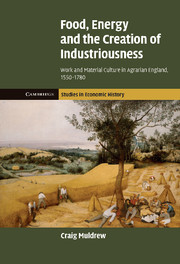 Food, Energy and the Creation of Industriousness
Food, Energy and the Creation of Industriousness Book contents
- Frontmatter
- Contents
- List of figures
- List of tables
- Preface
- Note on measurements and inflation
- List of abbreviations
- 1 Introduction
- 2 What did labourers eat?
- 3 Calories consumed by labourers
- 4 Labourers' household goods
- 5 Work and household earnings
- 6 Agricultural labour and the industrious revolution
- 7 ‘Honest’ and ‘industrious’ labourers?
- Conclusion
- Bibliography
- Index
- References
4 - Labourers' household goods
Published online by Cambridge University Press: 04 February 2011
- Frontmatter
- Contents
- List of figures
- List of tables
- Preface
- Note on measurements and inflation
- List of abbreviations
- 1 Introduction
- 2 What did labourers eat?
- 3 Calories consumed by labourers
- 4 Labourers' household goods
- 5 Work and household earnings
- 6 Agricultural labour and the industrious revolution
- 7 ‘Honest’ and ‘industrious’ labourers?
- Conclusion
- Bibliography
- Index
- References
Summary
Although food comprised the greater part of a labouring family's expenditure over the course of a year, the family also, of course, had to pay for clothing, rent and fuel for heat. There were also medical expenses for sickness and childbirth. House rents could vary widely according to custom and the degree to which the landlord was charging market rents. Rent has been estimated to be about £1 a year in the late seventeenth century for a pauper, and about 30s for labouring families, rising to between £2 and £4 by the 1760s. In the next chapter we will examine the changing cost of living based on the need to purchase such necessities, but labourers also, of course, had to purchase consumer goods to furnish their houses and to cook and eat with. In addition many labourers also possessed the farm equipment necessary to raise animals, grow crops and produce beer, milk, butter and cheese, either for home consumption or for sale.
Here we will analyse probate inventories taken after death, an excellent source which can be used to examine material goods. Probate inventories provide listings of rooms in a house together with their contents. They also list tools, production equipment, both in the house and in outbuildings or the yard, as well as farm animals and growing or harvested crops. In addition debts owed to the deceased were listed, and on rare occasions also the debts they owed to others.
- Type
- Chapter
- Information
- Food, Energy and the Creation of IndustriousnessWork and Material Culture in Agrarian England, 1550–1780, pp. 163 - 207Publisher: Cambridge University PressPrint publication year: 2011


